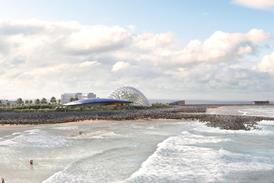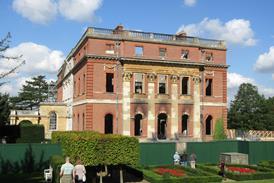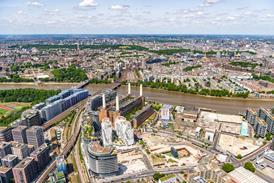- Home
 Grid Architects submits revised plans for O2 shopping centre with affordable housing cut to 20%
Grid Architects submits revised plans for O2 shopping centre with affordable housing cut to 20% Green light for Grimshaw’s scaled back Eden Project scheme in Morecambe
Green light for Grimshaw’s scaled back Eden Project scheme in Morecambe Georgian Group granted permission to pursue judicial review into decision to approve Allies and Morrison’s Clandon Park plans
Georgian Group granted permission to pursue judicial review into decision to approve Allies and Morrison’s Clandon Park plans Studio Egret West to masterplan remainder of Battersea Power Station development
Studio Egret West to masterplan remainder of Battersea Power Station development
- Intelligence for Architects
- Subscribe
- Jobs
- Events

Events calendar Explore now 
Keep up to date
Find out more
- Programmes
- CPD
- More from navigation items
50 Wonders | Smith Mordak: Floating reed island villages, Iraq

A 6,000-year-old community in southern Iraq has much to teach us in an age of climate fragility, writes Smith Mordak, newly appointed chief exec of the UK Green Building Council
In southern Iraq, a system of floating reed structures is clinging on to the site of one of the world’s greatest environmental disasters. The Mesopotamian Marshes have been continuously inhabited for over six thousand years and were once the largest wetland ecosystem in Western Eurasia. However, the second half of the 20th century saw them almost entirely drained for agriculture, oil and military purposes. What was a population of 500,000 Marsh Arabs (Ma’dan) was reduced to just 20,000. This draining by the Iraqi government and British engineers decimated the ecosystem causing the loss of 52 native fish species, wild boar, red fox, buffalo and water birds, as well as salt-tolerant vegetation and plankton-rich waters and their associated nutrient cycles.
…
This is premium content.
Only logged in subscribers have access to it.
Login or SUBSCRIBE to view this story

Existing subscriber? LOGIN
A subscription to Building Design will provide:
- Unlimited architecture news from around the UK
- Reviews of the latest buildings from all corners of the world
- Full access to all our online archives
- PLUS you will receive a digital copy of WA100 worth over £45.
Subscribe now for unlimited access.
Alternatively REGISTER for free access on selected stories and sign up for email alerts


